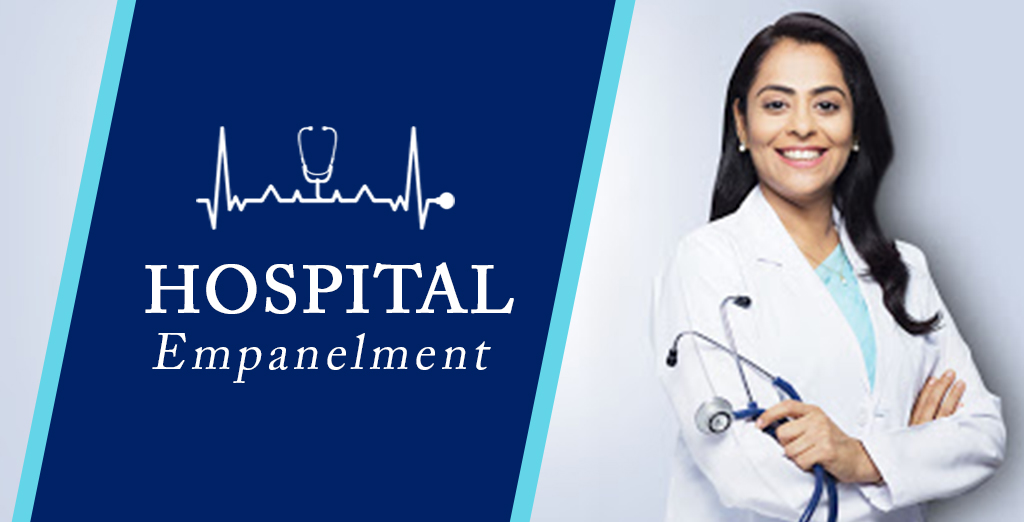
Empanelment is a crucial procedure that has a direct impact on the rise in the number of patients needing medical care or diagnostic testing. Any medical practise can profit in many ways from becoming enrolled. There is a network of providers used in the process of medical empanelment.
There are many advantages to every medical practise.
- increased patient base coverage,
- direct patient contact via other healthcare stakeholders.
- Giving patients convenience by offering a cashless facility
- Since empanelment involves a thorough verification process and patients view this as acknowledgement, especially in cases of government empanelment, the practise gains more trust.
- Exercise in brand development for the business
- The office or healthcare facility that is affiliated with this network offers cashless payment options or charges a minimal fee for hospitalisation or diagnostic services.
This network of providers consists of:
- Administrator of a third party (TPAs)
- Insurance Businesses
- agencies such as ECHS, CGHS, DGEHS, MCD, DDA, and others
- corporate partnerships for health examinations
Administrator of a third party (TPAS)
TPA primarily acts as a facilitator when it comes to giving insurance firms access to a cashless system. Some insurance providers work directly with the hospital to provide this service. They implement a mechanism to control hospital affiliations and empanelments. TPA is an intermediary organisation that has been given permission by the insurance provider with which it has a standard Mediclaim Policy.
Insurance Businesses
a business that sells insurance coverage to the general public, either directly to consumers or through other channels like employee benefit plans. Numerous insurance agents typically make up an insurance company. An insurance provider may offer a variety of insurance products, or they may focus on only one, like life, health, or auto insurance.
Government organisations such as ECHS, CGHS, DGEHS, and others
Governmental agencies include any department, board, commission, authority, institution, unit, or instrumentality of the federal government, a state, a county, municipality, conservation and reclamation district, hospital organisation, or other political subdivision of a state. They also include executive, legislative, and judicial agencies.
Expatriates Contributory Health Program (ECHS)
The ECHS went into operation on April 1, 2003. With the introduction of this plan. Former service members’ pensions and their dependents, who previously only had access to care in military hospitals, are now permitted to get care at both military and civil/private hospitals that have a formal agreement with the ECHS.
Government health programme central (CGHS)
With the aim of offering comprehensive medical care facilities to Central Government employees, pensioners, and their families residing in CGHS covered cities, CGHS was established under the Indian Ministry of Health and Family Welfare in 1954. Now, CGHS beneficiaries are permitted to receive treatment at private hospitals accredited by CGHS for specific treatment procedures listed in the CGHS rate list when advised to do so by a specialist in a central government/state government specialist hospital or a CGHS Medical Officer, without the need for any additional referral (permission) letters.
Health Plan for Delhi Government Employees (DGEHS)
In order to provide comprehensive medical services to Delhi Government employees, pensioners, and their dependents on the model of Central Government Health Scheme, DGEHS was established in April 1997. The scheme recognises all health facilities (hospitals and dispensaries) operated by the Government of the National Capital Territory of Delhi, autonomous bodies under the Delhi Government, local bodies such as the MCD, NDMC, Delhi Cantonment Board, and other Government bodies [such as AIIMS, Patel Chest Institute (University of Delhi), etc.]. Additionally, a few private hospitals and diagnostic labs that are occasionally notified are also acknowledged as referral medical facilities.
Corporate partnerships for health examinations
Hospital partnerships are necessary for businesses that engage in risky work in order to handle potential medical problems as they arise frequently. To maintain the procedure streamlined and swift, it is crucial to establish a formal agreement with the hospital in such a situation.
Corporate Health Checkup:
A happy workforce equates to a successful company. The productivity of the workforce increases dramatically when they are healthy. Organizations and businesses are putting a lot of attention right now on the wellness of their employees. Every organisation is required to conduct annual corporate health assessments. Such bad lifestyle choices can cause a number of ailments. Unfortunately, lifestyle diseases like heart problems, diabetes, high blood pressure, and even malignancies first show no symptoms and are asymptomatic. As a result, diseases are often hidden and go undiscovered until they are far advanced, at which point they require extensive, expensive, and challenging treatments.
